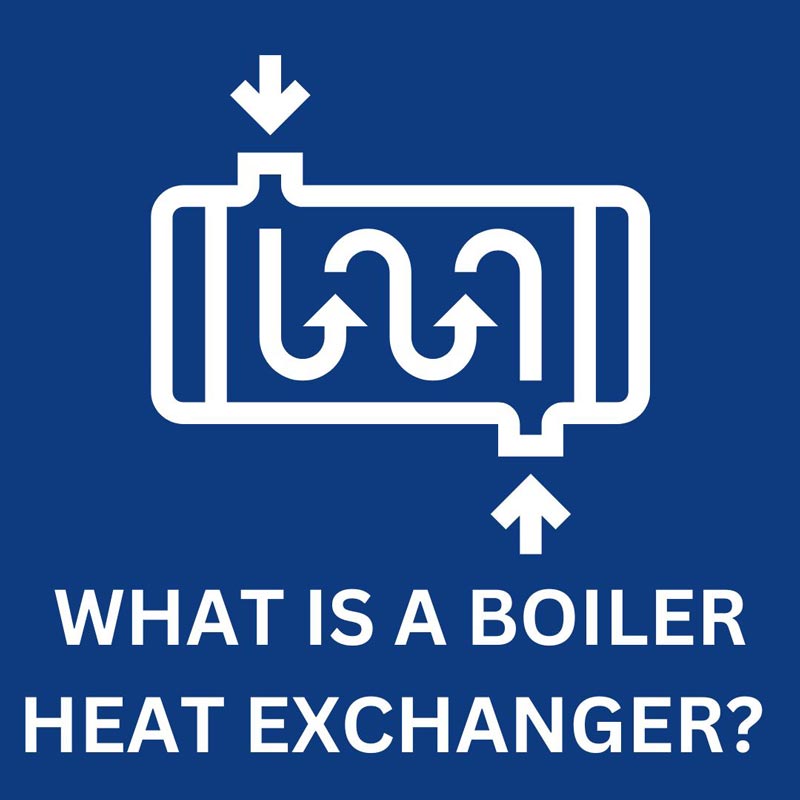
A Boiler heat exchanger is a vital part of your heating system that transfers heat from the combustion gases to the water flowing through the Boiler.
Acting as a conduit, it absorbs heat generated by burning fuel and uses it to warm the water circulating through radiators and taps. This process ensures your home receives consistent heating and hot water.
The heat exchanger’s design and efficiency are key factors in how well a Boiler operates, particularly in modern condensing Boilers, which maximise heat transfer to improve overall energy efficiency.
The Role of the Boiler Heat Exchanger
In simple terms, a heat exchanger transfers heat between two fluids without them mixing. In the case of a Boiler, it moves heat from the hot gases to the water that heats your home.
The heat exchanger is at the heart of this process, turning the energy from burning fuel into warm water that circulates through your radiators and provides hot water for your taps.
Materials like stainless steel and aluminium are used in heat exchangers because they conduct heat well and are durable. Their design ensures maximum heat transfer, helping to improve the Boiler’s efficiency and reduce energy waste.
How A Boiler Heat Exchanger Works
The heat exchanger is a condensing type designed for maximum efficiency in all modern Boilers installed today. Here’s how it functions: when the Boiler’s burner ignites, it produces hot combustion gases. These gases pass through the heat exchanger, which comprises metal plates or coils. The metal absorbs the heat from the gases and transfers it to the cold water flowing through the Boiler.
The primary heat exchanger heats the water circulating through your central heating system. As the combustion gases flow over the metal surface, the heat is transferred to the water pumped to your radiators. This heated water warms your home effectively.
In combi Boilers, a secondary heat exchanger is used to supply hot water on demand. When you turn on a hot tap, cold water enters the Boiler and passes through this secondary exchanger. It absorbs heat from the primary exchanger, providing a continuous flow of hot water.
Condensing heat exchangers are designed to capture extra heat by condensing the water vapour in the flue gases. This process recovers extra energy that would otherwise escape through the flue, making the Boiler far more efficient.
Modern condensing heat exchangers are typically made of stainless steel or aluminium, chosen for their excellent heat transfer properties and corrosion resistance. This design reduces fuel consumption, lowers carbon emissions, and helps keep heating costs down.
Common Heat Exchanger Problems and Solutions
While the heat exchanger is designed for durability and efficiency, it can develop issues, especially in older Boilers or if the Boiler isn’t annually serviced. Understanding these problems will help you spot early signs and take preventive measures.
Limescale Buildup
Limescale is a frequent issue, particularly in areas with hard water, like many parts of Essex. Over time, the minerals in hard water can deposit on the metal surfaces of the heat exchanger, creating a layer of limescale. This buildup reduces heat transfer efficiency, causing the Boiler to work harder and consume more energy. It may also lead to a noise called “kettling,” which sounds like a boiling kettle. Periodic descaling treatments and installing a water softener or scale reducer can help prevent limescale issues.
Corrosion
Corrosion can develop if the heat exchanger’s metal surface is exposed to acidic condensate or the Boiler’s water chemistry is unbalanced. This is more common in older Boilers or Boilers that haven’t been properly maintained. Corrosion can weaken the metal, leading to leaks or, in severe cases, total failure of the heat exchanger. Using corrosion inhibitors in the system and having the Boiler serviced regularly by a gas-safe engineer will help prevent corrosion.
Blockages
Over time, sludge or debris can accumulate in the central heating system, causing blockages in the heat exchanger. These blockages restrict water flow, reducing the Boiler’s efficiency and potentially leading to overheating. A magnetic filter can help trap sludge and particles before they reach the heat exchanger. Power Flushing the system periodically will also help clear any built-up debris.
Cracks or Leaks
Intense heating and cooling cycles can cause stress fractures in the heat exchanger. If you notice leaking water or a drop in Boiler pressure, a cracked heat exchanger might be the cause. A serious issue that requires immediate attention from a qualified Engineer, as a cracked heat exchanger can release dangerous flue gases into your home.
By watching for these issues and scheduling annual Boiler servicing, you will help extend the life of your heat exchanger and ensure your Boiler runs efficiently.
If you have any concerns, it’s best to consult a professional Boiler Engineer who will diagnose and address the problem safely.
Signs You May Need Heat Exchanger Repair or Boiler Replacement
The heat exchanger is an essential component of your Boiler, and when it fails, the entire heating system’s performance will be affected.
Here are some signs that your heat exchanger might need attention.
Reduced Heating Efficiency
If your radiators are not getting as warm as they used to, or your hot water temperature is inconsistent, it could be a sign that the heat exchanger isn’t transferring heat effectively. Limescale buildup or corrosion will reduce efficiency, making the Boiler struggle to meet your heating demands.
Unusual Noises (Kettling)
A common symptom of a failing heat exchanger is kettling—a noise that resembles a boiling kettle. This usually indicates limescale buildup, which restricts water flow and causes the metal to overheat. The resulting steam bubbles create a boiling kettle noise. Ignoring this issue can lead to serious damage, so it’s important to have it inspected by a qualified gas-safe registered Engineer.
Visible Leaks or Corrosion
Leaks around the Boiler or visible signs of corrosion on the heat exchanger are clear indicators of issues. Corrosion can weaken the metal, causing cracks or holes. Leaks not only reduce Boiler efficiency but can also be dangerous, as they might release harmful flue gases. Immediate attention from a Gas Safe registered Engineer is necessary if you spot these signs.
Fluctuating Boiler Pressure
If you notice frequent drops in Boiler pressure, it could be due to a leak in the heat exchanger. A cracked or damaged exchanger may cause the system to lose pressure, affecting the central heating and hot water supply.
Error Codes or Warnings on the Boiler Display
Modern Boilers often have sensors and displays that alert you to potential problems. If your Boiler shows an error code related to heat transfer issues or a malfunctioning heat exchanger, it indicates that something needs to be repaired or replaced.
Given the importance of the heat exchanger, any of these signs should be taken seriously. Annual servicing will help detect issues early and prevent costly repairs or replacements.
If you suspect a problem with your heat exchanger, contact a Gas Safe registered Engineer for a professional diagnosis and safe repair.
Trouble With Your Boiler?
If you are having trouble with your Boiler and live in Essex, please Contact Us. A team member will inspect your Boiler and solve the issue for you.

Hi, I’m Terry, the founder and owner of TM Hughes & Son Gas Services
Please get in touch to book an appointment or receive a free, no-obligation quote
Call – 01245 830075
Get A Free Boiler Quote
0% Finance
For Boiler Installations
